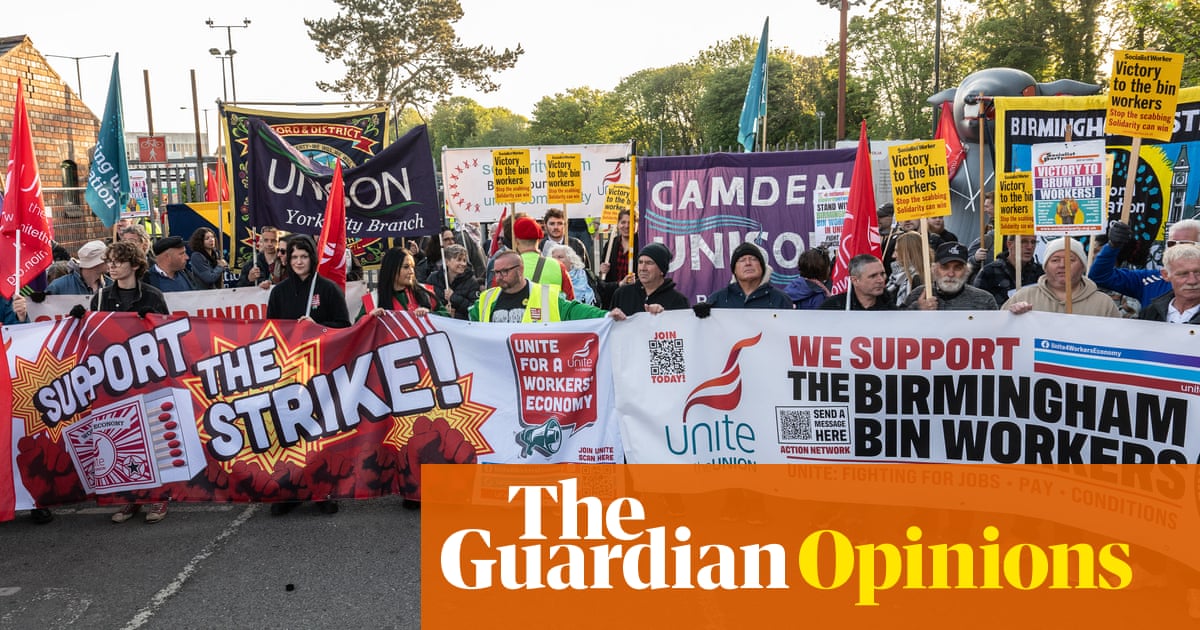Six months ago, it was a stirring, a mood felt in many workers’ meetings, on picket lines and doorsteps. What started as disappointment in Labour is now giving way to anger for many British workers and their communities. “Aren’t Labour supposed to be for workers?” is a line I hear daily now. Most recently, this sentiment has been felt in Birmingham, where bin workers for the Labour-run city council have been onindefinite strikesince 11 March.
These workers woke up one morning to be told they would lose up to a quarter of their pay – what Unite believes to be up to £8,000. This is “fire-and-rehire” by any other name. Bin lorry drivers are now being told they are next in line to lose the same amount in pay. What makes this scandal all the more egregious is that it is being perpetrated by a Labour council – enthusiastically backed by a Labour government. Onebin worker saidthis government “might be Labour in name, but it isn’t Labour in nature”.
That specific is mirrored in much more general conceptions. Labour voters can’t believe that this government would, with almost its first act,cut the winter fuel allowancefor pensioners, regardless of theU-turn it has now made. Then it attacked those on welfare benefits. Why would a Labour administration target some of the country’s most vulnerable people instead of making the rich pay more, through a real wealth tax? Unite research shows that the assets of the richest 50 families in the UK areworth £500bn. That’s more than the wealth of a third of Britain. A 1% tax on the richest 1% would raise £25bn. Labour in name but not in nature is right.
And nothing is more symbolic of Labour’s disconnection from its core mission than the catastrophe of the Birmingham bin strike. Angela Rayner, Labour MPs, and the leader of Birmingham city council, John Cotton, who incidentally has not attendedone single negotiationon the bin strike, have spent weeks, if not months, demanding that our members should simply accept “the fair and reasonable offer on the table”. The problem is there isn’t one.
I’ve seen this charade play out week after week since the strike began: Unite decision-makers are in the room with a group of council employees who clearly do not have the power to make any decisions. Hence, there have been no real negotiations and certainly no settlement of the dispute.
When Acas conciliation was suggested, I said I would be there in person and that I expected the leader of the council to do the same. After all, he had said in public just days before that “nobody needs to lose any pay” – surely we should have been in touching distance of a deal? But Cotton, once again, did not turn up to the talks, sending Joanne Roney, the managing director of the city council instead, who introduced herself as a decision-maker. I asked for a copy of the “fair and reasonable offer”, but yet again, none was produced.
Both Rayner and Cotton have cited lump sums in the thousands being put on the table, together with moves that would result in no loss of pay. None of this was seen at Acas. Nonetheless, the talks began, and a “ballpark” deal was discussed, one that could finally be taken back to workers to ballot. That was on the 6 May. Roney said she would send a written draft by 8 May, but at the time of writing, we have yet to receive the offer. A simple written offer dictating terms.
So why the delay? The government’s own commissioners – who have beenin placesince just after the council effectively declared itself bankrupt in 2023 – are now apparently blocking the deal, despite Rayner previously claiming central government has “no part in the decision-making of the dispute”. Roney is reportedly being prevented from putting in writing what we discussed at conciliation unless they agree to it. Of course, this is what Unite has been saying all along: Birmingham city council’s decision-makers are simply not in the room.
In 35 years of negotiating huge disputes, I have never seen such a shambles. Our members can see through Labour’s spin. How can a Labour council be doing this to their own workers? What happened to the “change” promised by Starmer?Make no mistake, these workers have the full backing of Unite. Losing up to a quarter of their pay means many won’t be able to pay mortgages or rent, or cover other basic living costs. This cannot be allowed to happen.
How can a Labour council and a Labour government preside over these pay cuts and say with a straight face that they are the party of workers? The recent local election results are a warning to Labour that the anger is becoming more widespread. The party needs to change course; driving “further and faster” while you are heading for a cliff doesn’t usually end well.
Sharon Graham is the general secretary of Unite
